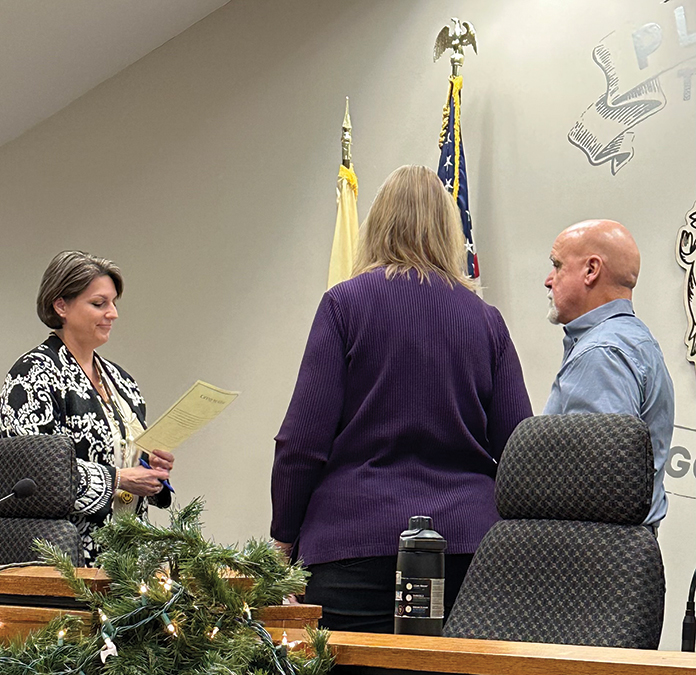TOMS RIVER – The first Township Council meeting of 2025 set the tone for what will undoubtedly be another lively year in Toms River politics, with arguments already starting about the First Amendment and transparency.
While Justin Lamb’s swearing in ceremony as council president was marked with traditional fanfare, the council’s vote for him was anything but unanimous.
Councilmen Jim Quinlisk and Tom Nivison voted against Lamb’s nomination as council president, while Councilman Dave Ciccozzi abstained from the vote. Quinlisk expressed frustration with the way the nomination process unfolded, sharing that Lamb left him a message the evening before the meeting.
Justin Lamb is sworn in as council president as his wife Ashley holds the Bible and his father and brother take part in the ceremony. (Photo by Stephanie Faughnan)
“I returned his call the next business day, and that’s when he told me he wanted my support,” Quinlisk said. “He wanted a unanimous vote going into the meeting. The president’s supposed to be picked by the whole council. The three of us never got to discuss who we wanted.”
Lamb began his first term in office in 2022 and is up for reelection this year. He is a sergeant with the Lavallette Police Department, where he has served for more than two decades. He is also a practicing attorney.
Mayor Daniel Rodrick administered the oath of office, with Lamb’s wife, Ashley, newly elected president of the Toms River Board of Education, holding the Bible. Lamb’s father, Robert (a Lavallette councilman), and his brother Zack were also a part of the ceremony.
Councilman Craig Coleman was selected as council vice president, with the results mirroring Lamb’s election.
In his inaugural speech as council president, Lamb expressed gratitude for Coleman’s service as president last year. “You are a class act, and you remained above the fray during a year of transitional success. This council will stay the course, always taking a small government posture with every decision we make,” Lamb stated.
Craig Coleman is sworn in as council vice president. (Photo by Stephanie Faughnan)
Mayor Rodrick expressed his gratitude for Coleman’s “unwavering dedication to our cause of fiscal responsibility and good governance.” He also referred to him as a “a true leader who stared into the storm – an embodiment of resilience in the face of an onslaught of opposition from a very small contingent of political agitators. Throughout his presidency, he faced a barrage of challenges from this handful of individuals – entrenched in the establishment – who sought to undermine our shared goals.”
The year 2024 was a stormy one for Toms River’s government. Council meetings were marked by near-constant chaos, with frequent clashes between the council, administration and members of the public. Outbursts became the norm. Sometimes, council members would storm off. Police escorted out at least one audience member for perceived misconduct at almost every meeting.
Coleman expressed his gratitude to the mayor, stating that he believes Rodrick consistently acts in the town’s best interest. He added that he plans to continue supporting Rodrick’s leadership, as he feels the mayor’s vision is steering the town in a positive direction.
Rodrick also expressed his appreciation for Lamb taking over as council president, saying that they have a long history from when they ran on the same ticket in 2019 during the primary election. “Together, we fought against overdevelopment – and fought for fiscal accountability in government – advocating for those issues that matter most to the people we now represent.”
Mayor Daniel Rodrick and Business Administrator Jonathan Salonis discuss new rules. (Photo by Stephanie Faughnan)
Changing Rules In 2025
During an interview, Lamb shared his vision for managing the upcoming year. A primary focus is ensuring more order and efficiency during council meetings. Lamb emphasized the need to adhere to the meeting agenda and maintain public decorum. He acknowledged that past meetings, which often stretched late into the night, were difficult to manage and frequently veered off track.
“There’s got to be rules, both for us (on the dais) and for the public,” Lamb stated. “We need to get through the agenda. In the past, meetings lasted three or four hours. That’s just not sustainable.”
Lamb admitted to the public that he’s been guilty of talking out of turn himself. When it comes to rebuttal and arguments with other members of the council, Lamb intends to call for a quick recess to go in the back room instead of hashing things out in public.
Council members who want to qualify their votes will now be required to vote first – and offer explanations after voicing their ayes, no’s, or abstentions. Council comments are limited to five minutes during the meeting.
One of the most significant changes instituted at the reorganizational meeting shifts council meetings from 7 p.m. to 4 p.m. Lamb focused on the expense involved in expecting department heads to return to work in the evening after the completion of their workday. The number of controversies last year led to many late-night meetings.
During the time allotted for council members to provide comments, Councilwoman-at-large Lynn O’Toole said she was pleased with the change in meeting time. Her concern was that older people don’t like driving in the dark.
Unless meetings are less than an hour, they’ll still be faced with the same predicament in the winter months. A few years ago, meetings were held at 6 p.m. They were changed to 5 p.m. during December for the holidays.
Nivison expressed hopes that the majority of governing body members would reconsider and come to a compromise. He and other members of the public said the change in time made it difficult for working people to attend meetings. Nivison suggested moving the time to 5:30 or 6 p.m. would be fair to accommodate work schedules.
Justin Lamb takes control as the Council President (Photo by Stephanie Faughnan)
“They changed the time to 4 o’clock so people can’t be here,” Ciccozzi told the public. “And if you think last year was bad, this year is going to be worse.”
“We do stream it live,” added Rodrick. “It does stay up on YouTube as far as being able to watch the meeting.”
“There was no discussion with us about moving the meeting to 4 o’clock,” said Quinlisk, who said he only saw the reorganizational meeting agenda for the first time 45 minutes before it began. He sees this as problematic when making informed decisions that require his vote.
Lamb said that the rules prohibit more than three council members from participating in agenda meetings before regular meetings. While the council president will consistently attend, two other council members will rotate in the sessions, which will also include department heads.
“I’m looking forward to a fair rotation this year,” Quinlisk shared.
Newly elected Councilman Bill Byrne offered little commentary during his council remarks. “Everybody knows I’m new here, without a doubt,” he said. “I’m following the majority of what goes by my fellow councilmen, and I’m going to do the best I can right now, I’m at a learning stage.”
The changes include a reduction in the time allocated for public comments, which caused great outrage among members of the public. No one was supplied written copies of the new rules which Lamb partially recited before public commentary. Some of what he said does not formally appear in the resolution, including the following:
“Speakers and members of the audience of all time shall maintain proper decorum and make their comments in a civil manner,” said Lamb. “Personal attacks, obscenity, derogatory, slanderous remarks will not be tolerated and can automatically cede your time.”
Under the new guidelines, each second reading of an ordinance will have a 30-minute cap on public comment, with individual speakers limited to three minutes. During the general public comment period, the allotted time will now be 60 minutes, with a three-minute limit per speaker. Community members are limited to one public comment period.
Additionally, any time spent responding to questions posed by a speaker – whether by the council president or other township officials – will count against the individual’s three-minute limit.
The public will no longer participate in discussions about items removed from the consent agenda. While members of the public can still request the removal of items from the consent agenda, this will be solely to hold council members accountable for their votes on those specific items.
Items on the consent agenda will not be read in full during the meeting. Instead, they will be read by description only, with the full text included in the official council minutes.
Michael Cohen was the first resident to speak during public comments and used his time to express negative opinions about Rodrick’s work as mayor. Lamb warned him that his views sounded derogatory and requested that he apologize. Cohen’s time was cut short when he asked questions about the mayor’s teaching job.
“This has nothing to do with the agenda and it’s not township business,” Lamb said. “I’m actually going to ask you to cede your time at this point.”
Toms River Town Hall (Photo by Jason Allentoff)
While others voiced their disapproval of the change in meeting time, still others suggested that the new rules violated First Amendment rights, with one pointing to viewpoint discrimination. However, Lamb countered saying that the law does not allow derogatory comments towards employees and name calling in a limited public forum.
Paul Williams, a frequent attendee of council meetings and a past participant in contentious exchanges leading to his removal, criticized the new rules for the lack of accountability for decorum among township officials. Referring to previous instances of disruptive behavior, Williams stated, “No restrictions, no consequences for the mayor yelling out constantly, calling people sellouts and more.”
“But I did hear restrictions on the people that lends itself to content-based restrictions on people’s First Amendment rights,” said Williams. “It’s very evident that restrictions are overly burdened on people and our ability to communicate and express ourselves to our elected officials, not our rulers, but our elected officials.”
NJ law recognizes that government bodies operating as limited public forums have the authority to regulate the conduct and scope of public comment sessions. This includes setting time limits for individual speakers and the overall session. Rules may also address decorum, such as prohibiting language intended solely to intimidate or threaten.
While public comment can be restricted to specific agenda items, municipalities must provide opportunities for the public to raise other concerns at some point during the meeting. These are considered “content-based” restrictions, which courts allow as long as they do not discriminate against speakers based on the viewpoints they express.
The post New Rules Cause Free Speech Concerns In Toms River appeared first on Jersey Shore Online.



